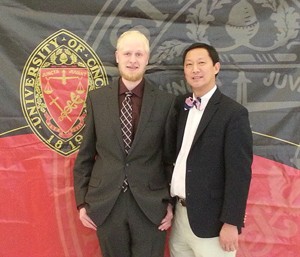
UC Students Awarded National Goldwater Scholarships
The
Barry M. Goldwater Scholarship and Excellence in Education Program
the most prestigious undergraduate award given in the sciences is awarded to about 300 college sophomores and juniors nationwide. A maximum of $7,500 per academic year is granted. The scholarship is awarded based on merit, and the actual amount given is based on financial need.
University of Cincinnati computer engineering student Daniel Griffin, and chemical engineering student Jarod Gregory are among this years sophomores and juniors to win the award
established by the United States Congress in 1986 in honor of former U.S. Senator and 1964 presidential candidate Barry Goldwater.
One part of Griffins research, performed with the guidance of Professor Jason Heikenfeld has dealt with the development of a
that can be used to remotely monitor patients. My research aims to develop cheap, novel, and easily distributable methods of remotely monitoring patients, Griffin said. This includes developing new devices for monitoring people's health, as well as developing new test analysis methods.
He says that, eventually, the technology hes working on will be easily used by every person. The sweat sensing patch
, for example, could be used by military personnel for monitoring patients, or sports teams for monitoring athletes. We're experimenting with different setups to see how feasible it is to make a device with varying degrees of disposability, as well as remote monitoring capabilities.

Goldwater Scholarship recipient Jarod Gregory.
Griffin says of the help and the opportunity to gain experience in engineering research afforded to him by Professor Heikenfeld, Because he allowed me to work in his lab as an undergraduate researcher from a very early point in my college career, I was able to gain valuable research experience and be competitive for this award.
Jarod Gregory, a chemical engineering and environmental engineering ACCEND student, is the lead researcher on a project to design a hydrogel-based biosensor that can autonomously move through surface waters and, in real-time, detect E. coli and other waterborne pathogens. So far, I have made a proof-of-principle system to show that our particular hydrogels can swim in water by utilizing patterned shrinking and swelling, Gregory explains. Hydrogels shrink and expel water at temperatures above 33 C, and swell up with water when below 33 C. Gregory says the publication for this part of the project is pending publication in the Journal of Applied Polymer Science.
We also have shown that our hydrogels can be functionalized to capture E. coli cells, and I am in the process of writing a publication for this phase of the project, he said. I am planning to continue this project as a doctoral student in environmental engineering here at UC.
Gregory, who is thankful for the guidance he received from research advisors Lilit Yeghiazarian, assistant professor in UC's College of Engineering and Applied Sciences, and Vasile Nistor, assistant professor of biomedical engineering, says this research will be used both for rapid harmful pathogen detection and improved watershed management techniques. The average person will generally benefit from cleaner water, and both rapid detection and improved watershed management techniques will hopefully contribute to cleaner water in the future.
The goal of the Goldwater Scholarship is to provide a continuing source of highly qualified scientists, mathematicians, and engineers by awarding scholarships to college students who intend to pursue careers in these fields.
- Apply to UC's undergraduate program in computer engineering.
- Apply to UC's undergraduate program in biomedical engineering.
- See more about UC's Office of Nationally Competitive Awards.
Related Stories
New AI tool assesses risk of self-harm
May 9, 2024
An assessment tool that leverages a powerful new artificial intelligence was able to predict whether patients exhibited suicidal thoughts and behaviors using a quick and simple combination of variables.
UC researchers develop speech therapy video game
May 7, 2024
With ultrasound and a video game featuring a goat on roller skates, researchers at the University of Cincinnati are developing methods to help children overcome difficulties in pronouncing certain sounds, including the difficult “R.”
UC engineering students can co-op in research labs around the...
May 7, 2024
More than 100 years ago, cooperative education (co-op) was invented at the University of Cincinnati's College of Engineering and Applied Science. Since then, UC has spent the last century fine-tuning and improving the program. The Global Research Labs Program is one of the most recent advancements in co-op opportunities for students.
